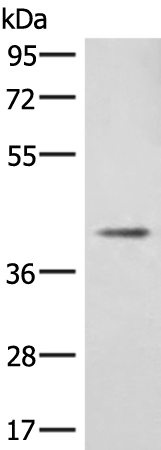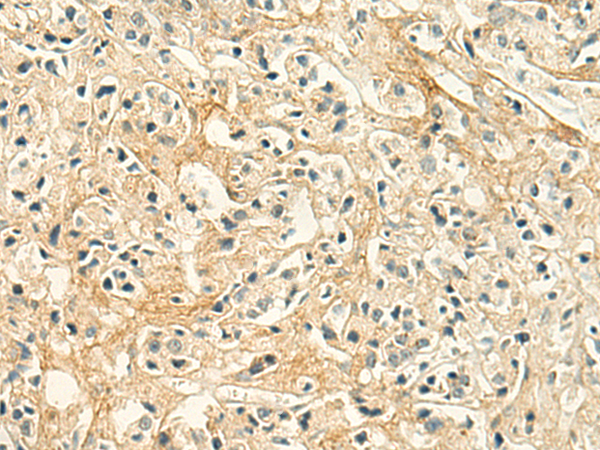

| WB | 咨询技术 | Human,Mouse,Rat |
| IF | 咨询技术 | Human,Mouse,Rat |
| IHC | 1/50-1/300 | Human,Mouse,Rat |
| ICC | 技术咨询 | Human,Mouse,Rat |
| FCM | 咨询技术 | Human,Mouse,Rat |
| Elisa | 1/5000-1/10000 | Human,Mouse,Rat |
| Aliases | CSCD; PG40; PGII; PGS2; DSPG2; SLRR1B |
| WB Predicted band size | 40 kDa |
| Host/Isotype | Rabbit IgG |
| Antibody Type | Primary antibody |
| Storage | Store at 4°C short term. Aliquot and store at -20°C long term. Avoid freeze/thaw cycles. |
| Species Reactivity | Human, Mouse, Rat |
| Immunogen | Fusion protein of human DCN |
| Formulation | Purified antibody in PBS with 0.05% sodium azide and 50% glycerol. |
+ +
以下是关于DCN(核心蛋白聚糖)抗体的3篇参考文献示例,包含文献名称、作者及摘要内容概括:
1. **文献名称**: *Decorin regulates collagen fibrillogenesis during zebrafish tendon morphogenesis*
**作者**: Zhang G, et al.
**摘要**: 该研究利用斑马鱼模型,通过抗DCN抗体免疫组化分析,发现核心蛋白聚糖(Decorin)通过调控胶原纤维的组装影响肌腱发育。研究表明,DCN抗体在定位胶原结合位点及组织重塑中具有关键作用。
2. **文献名称**: *Targeting decorin in the tumor microenvironment as a novel therapeutic strategy*
**作者**: Neill T, et al.
**摘要**: 文章通过免疫印迹和免疫荧光技术,使用DCN抗体验证肿瘤微环境中核心蛋白聚糖的表达。研究发现,DCN通过抑制EGFR/MAPK信号通路限制肿瘤生长,提示其作为治疗靶点的潜力。
3. **文献名称**: *Decorin antibodies detect early-stage liver fibrosis in a murine model*
**作者**: Iozzo RV, et al.
**摘要**: 研究利用DCN特异性抗体在小鼠肝纤维化模型中检测到核心蛋白聚糖在细胞外基质的动态变化,证明其可作为早期纤维化生物标志物,并参与TGF-β信号通路调控。
4. **文献名称**: *Antibody-based profiling of decorin glycosylation in osteoarthritis*
**作者**: Scott PG, et al.
**摘要**: 该文献通过DCN抗体的糖基化特异性分析,发现骨关节炎患者软骨组织中核心蛋白聚糖的糖链修饰异常,提示其糖基化状态可能影响关节退行性病变的病理进程。
---
以上文献涵盖DCN抗体在发育生物学、肿瘤微环境、纤维化及疾病机制研究中的应用,具体信息建议通过PubMed或期刊数据库核对原文。
**Background of DCN (Decorin) Antibody**
Decorin (DCN) is a small leucine-rich proteoglycan (SLRP) predominantly found in the extracellular matrix (ECM). It plays a critical role in regulating collagen fibrillogenesis, maintaining tissue integrity, and modulating cell signaling by interacting with growth factors (e.g., TGF-β) and receptors (e.g., EGFR). Structurally, decorin consists of a core protein (∼40 kDa) linked to a single glycosaminoglycan chain, typically chondroitin/dermatan sulfate. Its leucine-rich repeats mediate interactions with collagen and other ECM components.
DCN is implicated in diverse physiological and pathological processes. In cancer, it exhibits tumor-suppressive properties by inhibiting angiogenesis, metastasis, and cell proliferation. Conversely, decorin overexpression is associated with fibrosis, as seen in liver, kidney, or lung diseases, where it promotes ECM remodeling. Additionally, decorin influences immune responses and wound healing.
DCN antibodies are essential tools for detecting decorin expression in tissues or biological fluids. They are widely used in research to study ECM dynamics, fibrosis progression, tumor biology, and connective tissue disorders. These antibodies are also explored for diagnostic applications, such as assessing fibrosis severity, or therapeutic potential, including targeting decorin-related pathways in diseases. Commercial DCN antibodies are typically validated via Western blot, immunohistochemistry, or ELISA, with species reactivity spanning humans, mice, and rats. Understanding decorin's dual roles in tissue homeostasis and disease underscores the importance of DCN antibodies in both basic research and clinical contexts.
(Word count: 245)
×